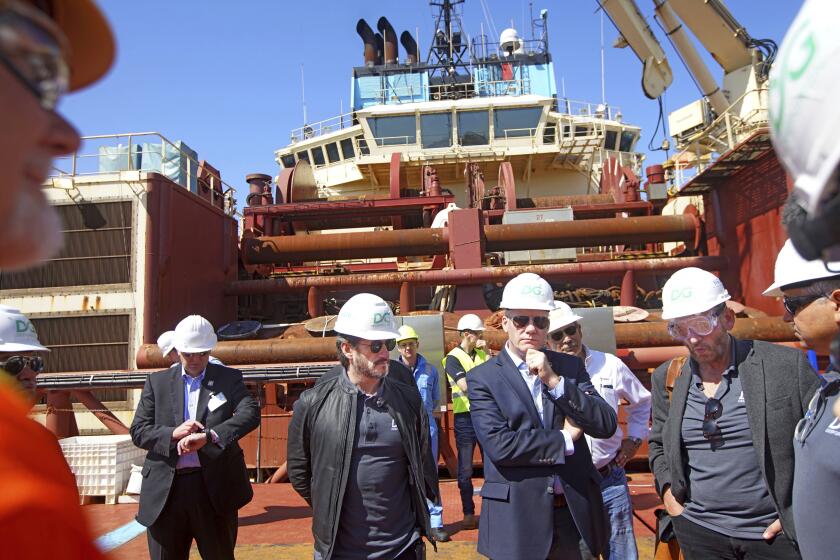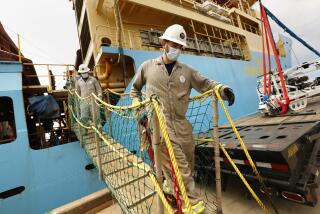Statements provided by attorney for International Seabed Authority
- Share via
A lawyer representing the International Seabed Authority provided these responses to questions via email.
On the ISA’s autonomy
“The ISA is not part of the United Nations but rather is an independent, autonomous international organization to which U.N. rules, for U.N. purposes, do not apply.”
Mining firms want to scrape the seabed for minerals used in electric car batteries. Scientists worry about conflicts of interest with the gatekeeper to mining permits.
On ISA Secretary-General Michael Lodge’s appearance in a mining company’s promotional video
“The mandate of the ISA is to regulate activities and promote and encourage marine scientific research in the Area, to promote the orderly, safe and responsible management and development of the Area’s resources and to protect the marine environment, for the benefit of humankind as a whole. In furtherance of its objectives the Secretary-General has regular interactions with member States, contractors, state enterprises and private entities, including site visits, meetings in the margins of conferences, at research institutes, technology labs, research vessels and testing sites. These interactions reflect the proper and professional continuance of the ISA’s mandate. Many visits responsibly require personal protective equipment to be worn, and it would be entirely irresponsible for the Secretary-General not to comply with these health and safety requirements. The ISA had little control over the use of the images captured by third parties.”
On whether the ISA requires mining contractors to collect sufficient environmental data to effectively weigh the risks of industrial-scale seabed mining
“The UNCLOS [United Nations Convention on the Law of the Sea] mandate of the ISA is to regulate exploration and mineral-related activities in the seabed Area, including in respect of the advancement of marine scientific research, incorporating the best scientific evidence and applicable standards for the protection and preservation of the marine environment for the benefit of humankind. To this end the Legal and Technical Commission of the ISA has provided comprehensive guidance to contractors as to what it considers to be useful environmental baseline data, including guidance on sampling methodologies. All exploration contractors collect baseline environmental data and are progressively establishing environmental baselines. It is not the function of the ISA Secretariat to make qualitative judgments in respect of this baseline environmental data; rather the function of the ISA Secretariat at the exploration stage is to verify that the contractor has accurately and correctly reported the actual data it has collected each year in the format specified by the ISA, review whether the activities of the contractor meet the milestones and objectives specified in the approved plan of work for exploration and provide information to support the deliberations of the LTC to make their recommendations to the Council. This to date has taken place.”
Regarding an email from a mining company executive to Lodge
“The ISA is an autonomous international organization, made up of three distinct organs, the Assembly, the Secretariat and the Council (comprising 36 member States). All deliberations on the Mining Code take place in public, and decisions on the Code are made by the ISA Council and Assembly, not the Secretariat.”
On the concerns of scientists, environmentalists and some former staffers that there is a conflict in the mandate of the ISA to both regulate mining and take part in it
“There is no conflict within the mandate of the ISA. The ISA, through its constituent organs, fulfills its mandate to manage the regulation of seabed activities in the context of the aim of protecting the marine environment. There is no ‘inherent conflict of interest’ within that mandate. Developing a regime of effective regulation is at the heart of the ISA’s objectives. In the same way, nation states must administer seabed activities with the aim of protecting the marine environment in their territorial waters. All regulators, domestic or international, and in whatever sector or context, are required to balance competing interests. That is the very function of and why regulation is required. To conflate the effective regulation of diverse interests as a conflict of interest fails to understand this role.”
On the Enterprise
“UNCLOS envisages the Enterprise as an autonomous body separate from the ISA, supervised by an elected Governing Board and administered by an elected Director-General. The Enterprise is not yet operational. Pending its operationalization and consistent with the provisions of UNCLOS, the ISA Secretariat carries out certain limited and prescribed functions which mainly relate to the preparation of studies and assessments. Accordingly, neither its establishment nor these limited roles create any actual or potential conflicts of interest.”
On morale at the ISA
“The ISA consists of motivated, highly committed experts from more than 20 countries, working hard to fulfill the important mandate with which it has been entrusted by UNCLOS.”
On the temporary contracting out of budget oversight to a Hong Kong company that makes protein from insects
“The ISA does not comment on individual employment issues for reasons of confidentiality. Temporary staff recruitment, which is not subject to the competitive bidding process, can result in overall costs which are less than those associated with a full-time role.”
On the ISA’s financial controls
“The ISA is an autonomous international organization, made up of three distinct organs, the Assembly, the Secretariat and the Council. It has adopted Financial Regulations and Rules recommended by the Finance Committee, which is separate from the Council and the Secretariat and thereby the Secretary-General, and which is responsible for all matters of internal financial control and management. The rules include a safeguarding system of checks and balances, and an independent audit process whereby all expenditures are examined and any cases of fraud, wasteful or improper expenditure, or expenditure in breach of the rules would be reported. No such expenditure has ever been reported.”
On financial regulations and rules
“The ISA is not part of the United Nations but rather is an independent, autonomous international organization to which U.N. rules, for U.N. purposes, do not apply. It has adopted Financial Regulations and Rules recommended by a Finance Committee which is responsible for all matters of internal financial control and management and which include a safeguarding system of checks and balances, and an independent audit process. The ISA uses the same salary scale for professional staff as the United Nations and provides that common standards, methods and arrangements are applied to salaries, allowances and benefits of staff. However, as an independent legal entity the ISA has also adopted its own staff regulations and rules which are generally consistent with those of the U.N. but from time to time may vary. ISA accounts are independently audited by an external auditor.”
On an audit by Ernst & Young
“Publicly available accounts were prepared by Ernst and Young for the year end to 31 December 2018. Those accounts confirmed that the ISA financial statements presented ‘a true and fair view of the financial position of the Authority’ and that, consistent with the auditor’s obligation, they did not find ‘any indications of fraud or irregularities.’ The auditors, as is usual practice, made a number of recommendations in respect of matters which were largely the result of a transition, in common with other organizations at the time, to the International Public Sector Accounting Standards (IPSAS) which required a progressive adoption of new accounting standards.”
On the departures of former employees
“The ISA cannot provide any further detail for reasons of confidentiality but can confirm that it acted properly and professionally and complied with all regulations and human resources procedures.”









